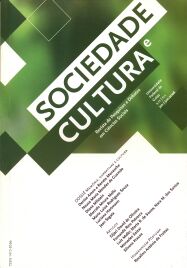Redes globais, laços locais: memórias da cidade de Lontras no Orkut
DOI:
https://doi.org/10.5216/sec.v11i1.4474Keywords:
antropologia do ciberespaço, redes sócio-técnicas, memória coletiva, localidade, globalidade.Abstract
Como parte das reflexões originadas de minha pesquisa de mestrado em antropologia, onde fiz uma etnografia em um ambiente construído no enredamento de algumas comunidades do orkut, o MSN e a cidade de Lontras, no interior do Estado de Santa Catarina, neste artigo busco refletir especialmente sobre uma das diversas formas e qualidades de interação nas redes sociotécnicas: a possibilidade de construção coletiva de memória. O nó central desta discussão se dá em uma comunidade do orkut que “homenageia o colégio” da cidade de Lontras, possibilitando o [re]encontro de alunos de diversas gerações, que construíram um ambiente de interação onde se pode perceber o caráter relativo da localidade e da globalidade dessas redes.Downloads
Download data is not yet available.
Downloads
Published
2008-08-03
How to Cite
SEGATA, Jean. Redes globais, laços locais: memórias da cidade de Lontras no Orkut. Sociedade e Cultura, Goiânia, v. 11, n. 1, 2008. DOI: 10.5216/sec.v11i1.4474. Disponível em: https://revistas.ufg.br/fcs/article/view/4474. Acesso em: 4 mar. 2026.
Issue
Section
Thematic Dossier
License
Authors who publish in this journal agree to the following terms:
- Authors retain the copyright and grant the journal the right of first publication, the work being simultaneously licensed under the Creative Commons Attribution License, which allows the sharing of the work with acknowledgment of authorship and of the initial publication in this journal;
- Authors are authorized to enter into additional contracts separately, for non-exclusive distribution of the version of the work published in this journal (eg, publishing in an institutional repository or as a book chapter), with acknowledgment of authorship and of the initial publication in this journal;
- Authors are allowed and encouraged to post and distribute their work online (eg, in institutional repositories or on their personal page) at any point before or during the editorial process, as this can bring productive change as well as increases the impact and the citation of the published work (see O Efeito do Acesso Livre).



